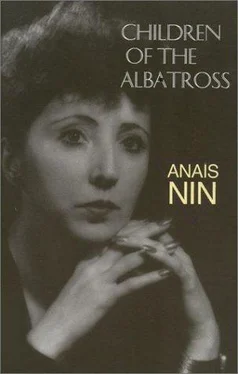Anaïs Nin - Children of the Albatross
Здесь есть возможность читать онлайн «Anaïs Nin - Children of the Albatross» весь текст электронной книги совершенно бесплатно (целиком полную версию без сокращений). В некоторых случаях можно слушать аудио, скачать через торрент в формате fb2 и присутствует краткое содержание. Год выпуска: 1959, ISBN: 1959, Издательство: Swallow Press, Жанр: Классическая проза, Эротические любовные романы, на английском языке. Описание произведения, (предисловие) а так же отзывы посетителей доступны на портале библиотеки ЛибКат.
- Название:Children of the Albatross
- Автор:
- Издательство:Swallow Press
- Жанр:
- Год:1959
- ISBN:9780804000390
- Рейтинг книги:4 / 5. Голосов: 1
-
Избранное:Добавить в избранное
- Отзывы:
-
Ваша оценка:
- 80
- 1
- 2
- 3
- 4
- 5
Children of the Albatross: краткое содержание, описание и аннотация
Предлагаем к чтению аннотацию, описание, краткое содержание или предисловие (зависит от того, что написал сам автор книги «Children of the Albatross»). Если вы не нашли необходимую информацию о книге — напишите в комментариях, мы постараемся отыскать её.
Children of the Albatross — читать онлайн бесплатно полную книгу (весь текст) целиком
Ниже представлен текст книги, разбитый по страницам. Система сохранения места последней прочитанной страницы, позволяет с удобством читать онлайн бесплатно книгу «Children of the Albatross», без необходимости каждый раз заново искать на чём Вы остановились. Поставьте закладку, и сможете в любой момент перейти на страницу, на которой закончили чтение.
Интервал:
Закладка:
Sitting there beside Matilda Djuna heard the echoes of the broken cell within the little psychic stage of her own heart, so well enacted, so neat, so clear, and wondered whether when her father left the house for good in one of his moods of violence as much damage had been done to her, and whether some part of her being had not been atrophied, preventing complete openness and complete development in living.
By his act of desertion he had destroyed a cell in Djuna’s being, an act of treachery from a cruel world setting her against all fathers, while retaining the perilous hope of a father returning under the guise of t men who resembled him, to re-enact again the act of violence.
It was enough for a man to possess certain attributes of the father—any man possessed of power—and then her being came alive with fear as if the entire situation would be reenacted inevitably: possession, love and desertion, replacing her on a bench like Matilda, awaiting a denouement.
Looking back, there had been a momentous break in the flow, a change of activity.
Every authoritarian step announced the return of the father and danger. For the father’s last words had been: “I will come back.”
Matilda had been more seriously injured: the life flow had stopped. She had retained the first image, the consciousness that she must wait, and the last words spoken by the lover had been a command for eternity: wait until I come back.
As if these words had been uttered by a proficient hypnotist who had then cut off all her communications with the living, so that she was not permitted even this consolation allowed to other deserted human beings: the capacity to transfer this love to another, to cheat the order given, to resume life with others, to forget the first one.
Matilda had been mercifully arrested and suspended in time, and rendered unconscious of pain.
But not Djuna.
In Djuna the wound had remained alive, and whenever life touched upon this wound she mistook the pain she felt for being alive, and her pain warning her and guiding her to deflect from man the father to man the son.
She could see clearly all the cells of her being, like the rooms of her house which had blossomed, enriched, developed and stretched far and beyond all experiences, but she could see also the cell of her being like the walled-in room of her house in which was lodged violence as having been shut and condemned within her out of fear of disaster.
There was a little cell of her being in which she still existed as a child, which only activated with a subtle anger in the presence of the father, for in relation to him she lost her acquired power, her assurance, she was rendered small again and returned to her former state of helplessness and dependence.
And knowing the tragic outcome of this dependence she felt hostility and her route towards the man of power bristled with this hostility—an immediate need to shut out violence.
Paul and Djuna sat listening to Cesar Franck’s Symphony in D Minor, in this little room of gentleness and trust, barring violence from the world of love, seeking an opiate against destruction and treachery.
So she had allied herself with the son against the father. He had been there to forbid and thus to strengthen the desire. He had been there, large and severe, to threaten the delicate, precarious bond, and thus to render it desperate and make each encounter a reprieve from death and loss.
The movements of the symphony and her movements had been always like Paul’s, a ballet of oscillations, peripheral entrances and exits, figures designed to become invisible in moments of danger, pirouetting with all the winged knowledge of birds to avoid collision with violence and severity.
Together they had taken leaps into the air to avoid obstacles.
THE CAFE
THE CAFES WERE THE WELLS of treasures, the caves of Ali Baba.
The cafes were richer even than the oriental cities where all living was plied openly under your eyes so that you were offered all the activities of the world to touch and smell. You saw your shoes being made from the skinning of the animal to the polishing of the leather. You saw the weaving of cloth and the dyeing in pails of multicolored liquids. You saw the scribes writing letters for the illiterate, the philosopher meditating, the religious man chanting as he squatted and the lepers disintegrating under your eyes, within the touch of your hand.
And so in the cafe, with one franc for a glass of wine and even less for coffee, you could hear stories from the Pampas, share in African voodoo secrets, read the pages of a book being written, listen to a poem, to the death rattles of an aristocrat, the life story of a revolutionary. You could hear the hummed theme of a symphony, watch the fingers of a jazz drummer drumming on the table, accept an invitation from a painter who would take you to the zoo to watch the serpents eat their daily ration of white mice, consult a secretive Hindu on his explorations of occult streets, or meet an explorer who would take you on his sailboat around the world.
The chill of autumn was tempered by little coal stoves and glass partitions.
A soft rain covered the city with a muted lid, making it intimate like a room, shutting out sky and sun as if drawing curtains, lighting lamps early, kindling fires in the fireplaces, pushing human beings gently to live under the surface, inciting them to sprout words, sparkling colors out of their own flesh, to become light, fire, flowers and tropical fiestas.
The cafe was the hothouse, densely perfumed with all the banned oils, the censured musks, the richest blooms accelerated by enclosure, warmth, and crossgraftings from all races.
No sunsets, no dawns, but exhibits of paintings rivaling all in luxuriance. Rivers of words, forests of sculptures, huge pyramids of personalities. No need of gardens.
City and cafes became intimate like a room that was carpeted, quilted for the easy intermingling of man’s inner landscapes, his multiple secret wishes vibrating from table to table as elbows and the garcon not only carried brimming glasses but endless messages and signals as the servants did in the old Arabian tales.
Day and night were colliding gently at twilight, throwing off erotic sparks.
Day and night met on the boulevards.eight=”0”>
Sabina was always breaking the molds which life formed around her.
She was always trespassing boundaries, erasing identifications.
She could not bear to have a permanent address or to give her telephone number.
Her greatest pleasure consisted in being where no one knew she was, in an out-of-the-way cafe, a little-known hotel, if possible a room from which the number had been scratched off.
She changed her name as criminals efface their tracks. She herself did not know what she was preserving from detection, what mystery she was defending.
She hated factual questions as to her activities. Above all she hated to be registered in any of the official books. She hated to give her birth hour, her genealogy, and all her dealings with passport authorities were blurred and complicated.
She lived entirely by a kind of opportunism, all her acts dictated by the demands of the present situation. She eluded tabulations only to place herself more completely at the disposal of anyone’s fantasy about her.
She kept herself free of all identifications the better to obey some stranger’s invention about her.
As soon as a man appeared the game began.
She must keep silent. She must let him look at her face and let his dream take form. She must allow time and silence for his invention to develop.
She let him build an image. She saw the image take form in his eyes. If she said what she wanted to say he might think her an ordinary woman!
Читать дальшеИнтервал:
Закладка:
Похожие книги на «Children of the Albatross»
Представляем Вашему вниманию похожие книги на «Children of the Albatross» списком для выбора. Мы отобрали схожую по названию и смыслу литературу в надежде предоставить читателям больше вариантов отыскать новые, интересные, ещё непрочитанные произведения.
Обсуждение, отзывы о книге «Children of the Albatross» и просто собственные мнения читателей. Оставьте ваши комментарии, напишите, что Вы думаете о произведении, его смысле или главных героях. Укажите что конкретно понравилось, а что нет, и почему Вы так считаете.












